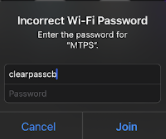Is South’s Wifi Deliberately Debilitated?

May 11, 2022
In an age in which technology is deeply ingrained in our lives for better or worse, rapid communication is undoubtedly positive in cases of emergency. Middletown South has notoriously bad connections, widely noted by complaining students and expectant teachers. Not a day passes at South without painfully slow connection, computers dying, or inability to use technology, amongst other irritating troubles.
To gain an understanding of why South suffers many technological woes, I talked to David Siwiak, Manager of Information Services in the Middletown School district.
According to Siwiak, personal devices operate use the LTE network provided by their data plan, not the school network. When students use their phones in school, because they are not given the password to the Wi-Fi network, they have difficulties with connection. Additionally, the structure of the building does not help.
Siwiak said, “The steel beams, concrete walls, and brick surfaces that compose our school buildings are not effective in allowing cellular signals to pass through and would most likely be the cause of slow, or no, connections in parts of the school.”
So why, then, are students and staff not given the Wi-Fi password? Wouldn’t allowing and encouraging school-wide connection that was guaranteed to be strong be an effective solution? Siwiak said, “School Wi-Fi passwords are not available to anyone in the schools, with the exception of a very few people, for security purposes…Even staff that have access to district Wi-Fi authenticate through their login accounts and not by using a shared password.” Takeaway question: Why is the alleged list so exclusive?
One can only assume that this is an intentional tactic to discreetly attempt to keep students off of their phone during the school day. Although in theory, this is a valid concern amongst South educators, it leads to questions of safety. The Wi-Fi appears more ardently protected than the students in South’s halls. If there were an unfortunate emergency of any kind, a text message could save lives. Living in an age where society is capable of constant communication, the wildfire spread of news is an advantage when safety is questioned. The inability to send a message or access internet in most parts of the school does more harm than good, and has potential to be worse.
However, even if the Wi-Fi was ever given to students and staff, there are other obstructions in the path to consistent, functional internet. Obtaining effective Wi-Fi able to cover majority of our school is a large financial investment. Siwiak explained, “There are hardware, software, and licensing costs incurred each time we add an additional access point to our wireless network.” Are these costs worth investing in? According to the 2020-2021 Tentative Budget Updates found on the Middletown District website, the answer is no. All proposed budget plans were reserved for repairs or replacements within the twelve schools, but there appeared to be no plans in the foreseeable future regarding better Wi-Fi or any technological advances.
The complicated status of South’s technological issues is still blurry and questionable, but unfortunately the future does not seem to be changing either.
*all opinions are those of the writer and do not necessarily reflect the views of The Eagle Eye

